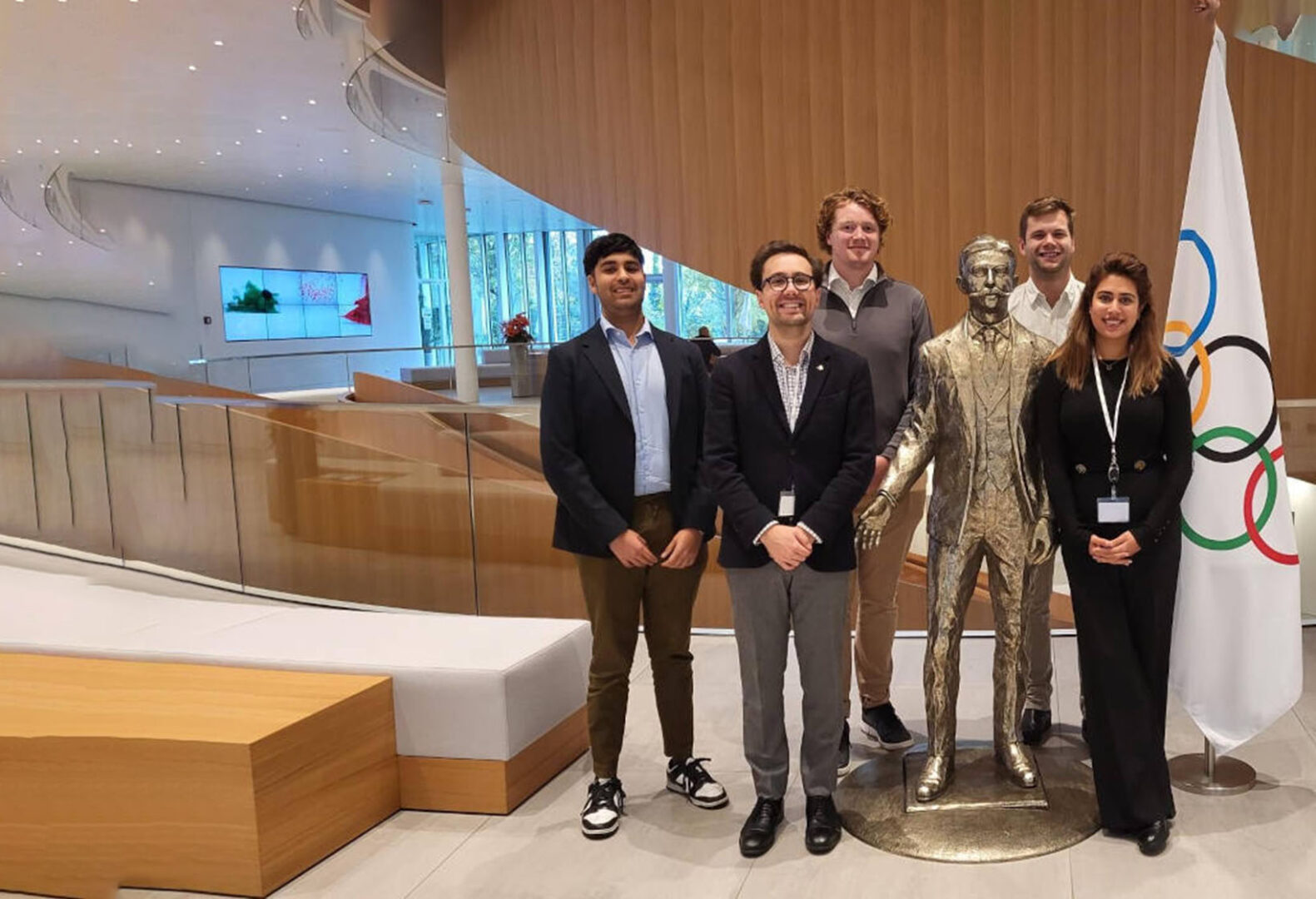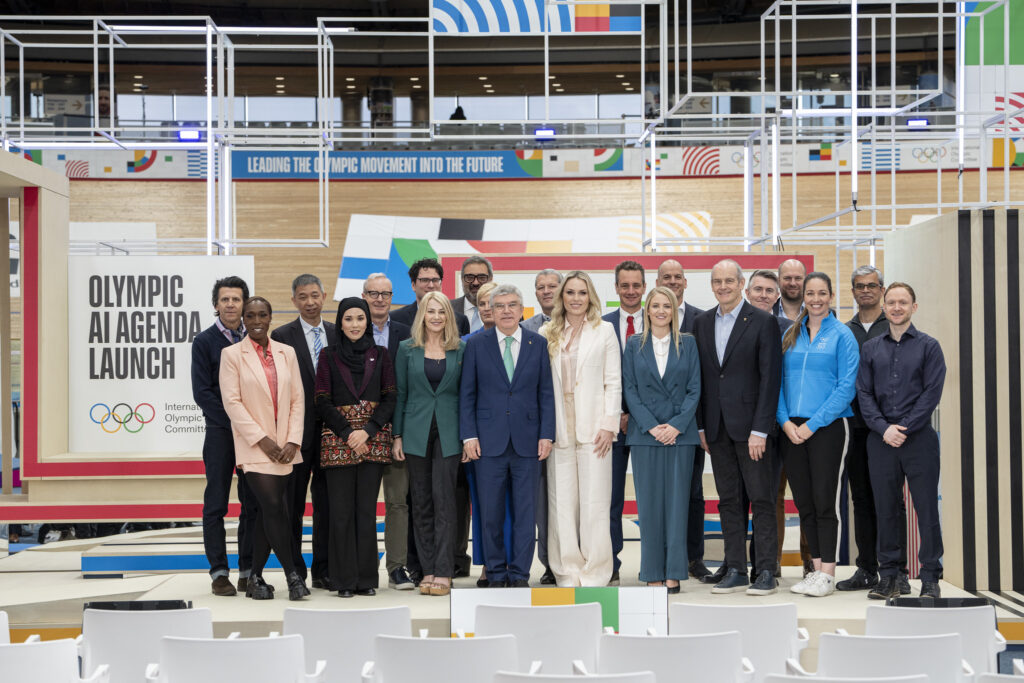
“Change or be changed” – so goes the imperative of IOC President Thomas Bach for a set of sweeping reforms introduced to ensure the Olympic Games remain economically, environmentally, and socially relevant in the future. It’s a saying that’s particularly apt given the accelerating development of artificial generative intelligence and its potential to upend industries – including the world of sport.
Determined to maximize the opportunities and manage the risks of AI, the IOC established an AI Working Group — a panel of experts from around the world, including AI pioneers, academics, athletes, and representatives of IOC TOP Technology Partners — to draw up an Olympic AI Agenda.
As part of this broad effort, they commissioned a team of five IMD MBA “consultants” to prepare a draft AI manifesto and deliver a detailed set of proposals on where the IOC should best focus its efforts.
“International Consulting Projects provide our MBA students with an immersion into real problems that organizations are dealing with and allow them an opportunity to apply their classroom learnings,” said Amit Joshi, Professor of AI, Analytics, and Marketing who was the faculty advisor for the ICP and one of the experts in the IOC’s AI Working Group.
“The project with IOC was special in this regard, since it involved working on an AI policy that would potentially influence athletes, sports organizations, and fans worldwide. Consequently, the ICP was a significant win-win, by giving the MBAs an opportunity to develop this policy at an early stage and providing the IOC with a proposal on which to build their overall manifesto,” explained Joshi.

Real-world learning
ICPs have long been a core part of the IMD MBA. Over seven weeks, students work full-time on an assignment to provide concrete actions plans for clients’ strategic solutions. The IOC team comprised five MBA candidates, including a former professional sportsman, one who had a background in the commercial side of the sports industry, two tech experts, and another with project management expertise.
The team contributed to the AI manifesto, which examines AI’s impact on athletes, staff, and fans, safety and accountability, fairness and inclusion, governance and collaboration, and environmental sustainability.
“One of the reasons I was excited to work on this project was because there were opportunities to deliver tangible insights that would be valuable for the IOC going forward,” said Nicolaas Heemskerk, who previously worked in a variety of commercial and marketing roles in the sports industry with organizations including INEOS, the Great Britain SailGP Team, and the NFL before embarking on his MBA in 2023.
The second part of the project involved preparing a presentation on the potential use and application of AI across the Olympic ecosystem. With the rapid development and emergence of new technologies and applications, the challenge was to come up with a concrete set of actionable recommendations that wouldn’t soon be obsolete, explained Harry Davies, a former professional rugby player.
The IOC identified around 200 potential use cases for AI and tasked the MBAs with providing suggestions on how to rank them, based on the scale of impact, costs, implementation complexity, timeline, and alignment with the IOC’s values. They decided to categorize their recommendations through the lens of five critical technology groups: Computer Vision, Digital Twins & Data Analysis, Content Creation, Content Curation, and Content Interface & Search. Across these five, they ultimately recommended focusing on 21 potential AI solutions, ranging from AI-powered broadcast solutions to venue development and planning to automated content creation and distribution, and more.
“The MBA team from IMD brought a fresh and informed perspective to our AI efforts, blending academic rigor with practical, industry-specific insights. Their contributions were greatly appreciated.” says Ilario Corna, IOC Chief Information and Technology Officer.
Corna and Leandro Larrosa, IOC Digital Engagement and Marketing Director, led the AI Working Group of the IOC. Larrosa says: “Working with the MBA team from IMD offered a new perspective on our AI initiatives. Their recommendations were both useful and actionable.”

A targeted AI approach
As well as having the chance to provide suggestions on solutions that could be adopted across the Olympic movement, the ICP also taught the MBAs valuable lessons about how to weave AI into an over-arching organizational strategy.
“As with any business challenge, it’s important to be clear about the objectives you are trying to achieve. Don’t just jump on the bandwagon because everyone else is doing it but look at what problem you are trying to solve and how AI could help solve it,” said Heemskerk.
“A good starting point is understanding the capabilities of AI and then aligning those capabilities with your organization’s objectives to work towards implementable solutions,”, added Davies.
“AI can really be implemented in everything across probably every part of your business. It’s about finding the topics and areas within the business that would really make the most sense.”
Find out more information on IMD’s International Consulting Projects here.


